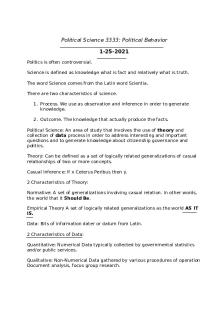Political Behavior Exam 1 Review PDF

| Title | Political Behavior Exam 1 Review |
|---|---|
| Author | Heena LoVe |
| Course | Civil Liberties |
| Institution | The University of Texas at Dallas |
| Pages | 10 |
| File Size | 292.3 KB |
| File Type | |
| Total Downloads | 96 |
| Total Views | 135 |
Summary
Download Political Behavior Exam 1 Review PDF
Description
Political Behavior Exam 1 review (anything in red needs defining, also if you see any mistakes, feel free to correct)
Part I Politics: Set of activities that defines and maintains a community's framework of order, allowing for arrangement into stability of change; Community development, core values, stability, preservation of the good Science: Latin-Scientia: Knowledge
Science o Process: procedure for gathering knowledge, through observation, and leading to detection of truth or “laws” Laws in science: irrefutable fact o Outcome: Laws in science: irrefutable fact It is the truth or the “law”
**take away is that process and outcome are related to one another Scientific law - consistently proven, irrefutable statements about some aspect of the real world Political science: political inquiry that involves the use of theory and the collection of data (process) to address interesting and important questions and generate knowledge (outcome) about citizenship, governance, and politics Theory: a set of logically related generalizations, about causal relationships between concepts
Good scientific theory characteristics: o Must be important, as in nontrivial. You can determine if something is trivial or not by finding it to be researchable, and relevant [it attempts to improve the quality of life] o Must have broad coverage; widely applicable, not currently found in Political Science field o Must be simple – Must be able to explain as much as possible using few variables or concepts o Predictive capacity - theory must do more than just guess
Data: bits/bytes of information. The word data is latin, it is the plural form datum. Datum/data: a bit or piece/s of information. Data types
Qualitative: phenomenon that is not innumerable; very difficult to innumerate Quantitative: information we can assign numbers to
The more qualitative the data, the less cases we have. The more quantitative data we have, the more cases we have. Quantitative data usually appears in the form of Political Behavior surveys/polls.
Theory-data relationship: Degree of fit what theory is saying on one hand what the data says on the other. Theory-data relationship types:
Induction: Data to Theory, to identify patterns to construct a theory (Specific to general) Deduction: Theory to Data Non-linear, circular process Demarcation criterion: how strict this must be
Part II Policy approach: older, newer (including “fundamental problem”): the question of how can we design institutions that make the pursuit of self-interest compatible with the achievement of the common good and social wellbeing. involves use of explanatory models and alternative data, qualitative/quantitative, to find an optimal solution (ideally positive positive, never negative negative) from a set of possible solutions to a current public policy problem Policy approach considerations: benefits-costs, ethics/morality, political feasibility Policy approach considerations benefits-cost: Policy analysis is through cost benefit calculations plus policy analyst present these to policy deciders often a government official that choosees to assert list of options or not. Policy approach considerations ethics/morality:
Ethical and moral life considerations. Value of human life is one of the most ethical and moral considerations in the U.S
Political approach considerations feasibility:
PS=f(C,C BC, + political feasibility PSSet :
a) C>B cost are calculated are more than benefits b) C=B cost are calculated are equal to benefits c) C...
Similar Free PDFs

Political Behavior Exam 1 Review
- 10 Pages

Political Science Exam Review
- 36 Pages

Political Behavior 3333
- 18 Pages

Albano Political Law Review
- 35 Pages

Animal Behavior Comprehensive Review
- 26 Pages

Political Law Exam 2019
- 31 Pages

Exam 1 review guide
- 8 Pages

Exam 1 Review Notes
- 10 Pages

Exam 1 review questions
- 28 Pages

Unit 1 Exam Review
- 4 Pages

MAR3023 Exam 1 Review
- 4 Pages

Biology Exam Review 1
- 3 Pages

DB Exam 1 Review
- 7 Pages

Exam 1 Review Sheet
- 10 Pages
Popular Institutions
- Tinajero National High School - Annex
- Politeknik Caltex Riau
- Yokohama City University
- SGT University
- University of Al-Qadisiyah
- Divine Word College of Vigan
- Techniek College Rotterdam
- Universidade de Santiago
- Universiti Teknologi MARA Cawangan Johor Kampus Pasir Gudang
- Poltekkes Kemenkes Yogyakarta
- Baguio City National High School
- Colegio san marcos
- preparatoria uno
- Centro de Bachillerato Tecnológico Industrial y de Servicios No. 107
- Dalian Maritime University
- Quang Trung Secondary School
- Colegio Tecnológico en Informática
- Corporación Regional de Educación Superior
- Grupo CEDVA
- Dar Al Uloom University
- Centro de Estudios Preuniversitarios de la Universidad Nacional de Ingeniería
- 上智大学
- Aakash International School, Nuna Majara
- San Felipe Neri Catholic School
- Kang Chiao International School - New Taipei City
- Misamis Occidental National High School
- Institución Educativa Escuela Normal Juan Ladrilleros
- Kolehiyo ng Pantukan
- Batanes State College
- Instituto Continental
- Sekolah Menengah Kejuruan Kesehatan Kaltara (Tarakan)
- Colegio de La Inmaculada Concepcion - Cebu

